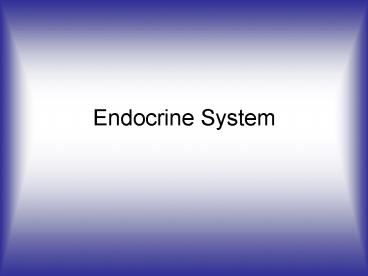Endocrine System - PowerPoint PPT Presentation
1 / 36
Title:
Endocrine System
Description:
Melatonin (regulation of sleep/wake cycles, overall level of activity, reproductive cycles) ... Acromegaly = over-secretion of hGH during adulthood (see bk) ... – PowerPoint PPT presentation
Number of Views:250
Avg rating:3.0/5.0
Title: Endocrine System
1
Endocrine System
2
Hormone
- molecule that is released in one part of the
body but regulates the activity of cells in
another part - Chemical signal travels thru blood, binds to a
receptor and causes changes - Hormon to set in motion
3
How different from NS?
- Non-conscious
- Slower onset
- Longer lasting
- Circulate widely
- Only affects sensitive area (receptor)
- Different effects can happen with different
levels.
4
http//www.emc.maricopa.edu/faculty/farabee/BIOBK/
endocrorgs.gif
5
Pineal gland
- Melatonin (regulation of sleep/wake cycles,
overall level of activity, reproductive cycles)
6
Pineal Gland
- Seasonal affective disorder ? depression, desire
to sleep w/onset of winter
http//www.consumermedhelp.com/Images/DayLightClas
sic.jpg
7
http//www.emc.maricopa.edu/faculty/farabee/BIOBK/
endocrorgs.gif
8
Hypothalamus
- Produces secretes 6 releasing and inhibiting
hormones ? act on diff cells in pituitary glands
anterior lobe - Hence, master of the master gland
- Produces ADH (conserves water) and oxytocin
(roles in childbirth, milk secretion formation
of attachments)
9
http//www.emc.maricopa.edu/faculty/farabee/BIOBK/
endocrorgs.gif
10
Pituitary gland the master gland
- controlled by the hypothalamus
- two lobes anterior and posterior
11
Pituitary Gland
- Anterior lobe
- 4 hormones stimulate other glands.
- ? ACTH -- adrenocorticotrophic hormone
- ? TSH -- thyroid stimulating hormone
- ? FSH follicle stimulating hormone
- LH luteinizing hormone
- 2 others stimulate overall growth and development
- ? prolactin ? mammary glands
- ? somatotopin ? GH promotes growth in young
- Posterior Lobe
- Stores, secretes 2 hypothalamic hormones (ADH and
oxytocin)
12
Remember oxytocin?
13
Pituitary Gland
- Pituitary dwarfism undersecretion of hGH during
the growth years - Giantism (gigantism) oversecretion of hGH
during childhood - Acromegaly over-secretion of hGH during
adulthood (see bk)
http//www.gigantism.com/robert-wadlow.jpg
14
http//www.emc.maricopa.edu/faculty/farabee/BIOBK/
endocrorgs.gif
15
Thyroid Gland
- Throxine and triiodothyronine T3 and T4 (roles
in growth, development, metabolic control) - Contain iodine
- Calcitonin (decreases blood levels of calcium
ions)
16
(No Transcript)
17
Thyroid problems?
- Hyperthyroidism
- Hypothyroidism
18
Thyroid Gland
- Cretinism congenital hypothyroidism (see bk)
- Myxedema (adult hypothyroidism) puffy face,
slow heart rate - Graves disease production of antibodies that
mimic TSH ? large thyroid
http//www.emedicine.com/ent/images/51terris_grave
s_fig1AB.jpg
19
Goiter enlarged thyroid due to lack of iodine
20
http//www.emc.maricopa.edu/faculty/farabee/BIOBK/
endocrorgs.gif
21
(No Transcript)
22
Parathyroid glands (4)
- Parathyroid hormone (increases blood levels of
calcium ions) - Hypoparathyroidism ? deficiency of Ca2,
spontaneous action potentials
23
http//www.emc.maricopa.edu/faculty/farabee/BIOBK/
endocrorgs.gif
24
Thymus gland
- Thymosins (roles in immunity)
- Lymphoma/Hodgkins Disease ? cancer
25
http//www.emc.maricopa.edu/faculty/farabee/BIOBK/
endocrorgs.gif
26
(No Transcript)
27
Adrenal glands (2)
- Cortex
- Cortisol (affects glucose metabolism) and
aldosterone (conserves sodium) and androgens - Medulla
- Epinephrine and norepinephrine (these interact,
in concert with the sympathetic nervous system,
to help adjust organ activities, especially
during times of excitement or stress)
28
Adrenal Gland
- Cushings syndrome ? breakdown of muscle proteins
redistribution of fat ? spindly arms and legs,
moon face - Addisons disease ? lethargy, anorexia, nausea,
weakness, dec cardiac output - Pheochromocytomas ? over-secretion of
epinephrine, prolonged fight-or-flight - Congenital adrenal hyperplasia (CAH) --gt low
cortisol, enlarged adrenal glands, virilism
(masculinization)
29
http//www.emc.maricopa.edu/faculty/farabee/BIOBK/
endocrorgs.gif
30
(No Transcript)
31
(No Transcript)
32
Pancreas
- controls glucose metabolism
- Insulin (lowers blood level of glucose)
facilitates glucose entry into cells and glycogen
formation in the liver - Glucagon (raises blood level of glucose)
increases blood glucose levels but causing
breakdown of glycogen
33
Pancreas
- Diabetes mellitus liver body unable to take
up and/or metabolize glucose - Type I
- Type II
- Hyperinsulinism
34
http//www.emc.maricopa.edu/faculty/farabee/BIOBK/
endocrorgs.gif
35
Gonads
- Ovaries
- Estrogens and progesterone (maintain primary sex
organs, influence secondary sexual traits) - Testes
- Testosterone (develops and maintains primary sex
organs, influences secondary sexual traits)
36
Bibliography
- Human Biology Sylvia Mader
- Introduction to the Human Body Tortora and
Grabowski - Anatomy and Physiology Jenkins, Kemnitz and
Tortora































